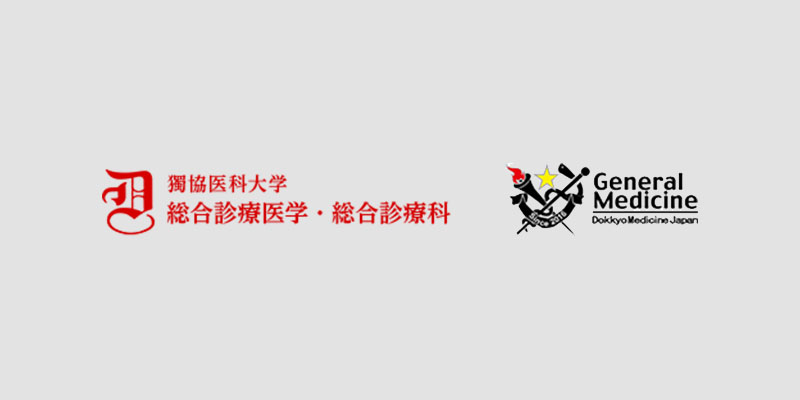
Nov 26(Tue) Diagnosis Insight 2024 Asia 開催のお知らせ 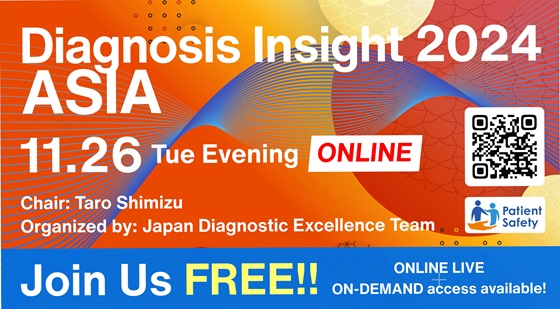
Diagnosis Insight 2024 Asia
Date and Time: November 26(Tue) 19:30-21:30 JST, 2024
*Please refer to the table at the bottom of the page for other areas.
Location: Zoom
Register here:
https://docs.google.com/forms/d/e/1FAIpQLSepWmDcGU7YfhCp0RwkXpVrfcuXSyb_Py4afY4bO94UqD9fuQ/viewform
Overview
The Diagnosis Insight 2024 conference is not just another event. It’s a unique opportunity to join a global community of leaders and players in diagnostic excellence. The conference will be a game-changer with a scientific perspective that engages all learners interested in diagnosis and experts in diagnostic reasoning, from practitioners to researchers. It is a chance to delve into the micro-meso perspective, connected to the macro level, all within the context of Diagnostic Excellence and health quality and safety.
The specific agenda summary is as follows:
Introducing insights into new practice theories of diagnostic reasoning from the perspective of diagnostic excellence, exploring next-generation formats of diagnostic reasoning beyond DPT. Presentations on the position of clinical reasoning in diagnostic excellence research, aligned with the 2024 WHO statements. Sessions on effectively utilizing AI as diagnostic experts from the perspective of clinical education. Simultaneously, reviewing the history of improving diagnosis and examining the future of clinical reasoning constitutes one of its core elements.
Objectives
After this course, attendees will be able to:
- Obtain insights into the practice and clinical reasoning education for immediate application.
- Gain an overview of the future of clinical reasoning research in diagnostic quality and safety.
- Deepen their understanding of the relationship between diagnosis and technology.
Schedule
- Warm welcome from Taro Shimizu
- Overview from Dr. Masaru Kurihara and Ms. Ogusa Shibata at WPRO (15min)
- “Reducing the Global Burden of Diagnostic Errors in Healthcare Through Science, Policy and Practice” from Prof. Hardeep Singh (15min)
- “High Reliability in Clinical Diagnosis: Reducing Noise with Intuitive Bayesian Thinking and Metacognition” from Prof. Tow Keang Lim (15min)
- Q and A session (10min)
- “Management of Diagnostic Uncertainty for Achieving Diagnostic Excellence” from Dr. Masayuki Amano (15min)
- “TWED Checklist To Facilitate Metacognition In Clinical Decision-making” from Prof. Chew Keng Sheng (15min)
- “Mastering Diagnostic Reasoning: A Human-Focused Strategies for Excellence” from Prof. Shimizu (15min)
- Q and A session (10 min)
- Closing remarks from Prof. Shunzo Koizumi
Presenters
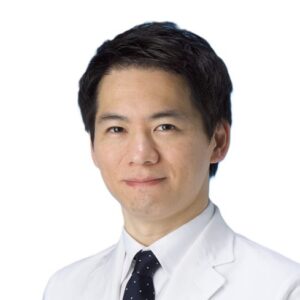
Taro Shimizu, MD, PhD, MSc, MPH, MBA, FACP
Professor, Department of Diagnostic and Generalist Medicine, Dokkyo Medical University, Japan
Chair, Japan Diagnostic Excellence team
Title: Mastering Diagnostic Reasoning: A Human-Focused Strategies for Excellence
Abstract: Improving diagnosis requires a focus on improving patient experience and communication while addressing diagnostic uncertainty, guided by situated cognitive theory. This endeavor demands the integration of teamwork and technology, ensuring resource optimization at minimal cost. A comprehensive, multi-layered approach is critical, encompassing macro-level systems and micro-level clinical practice and human factors. Drawing from the perspective of a frontline expert in medical diagnosis and diagnostic education, this presentation will delve into how training physicians regarding diagnostic reasoning in the context of human factors can directly elevate diagnostic practice, fostering impactful advancements in diagnosis across diverse healthcare environments.
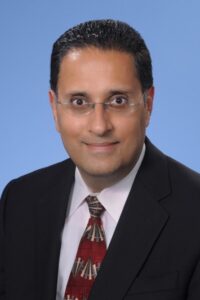
Hardeep Singh, MD, MPH
Co-Chief, Health Policy, Quality and Informatics Program, Center for Innovations in Quality, Effectiveness and Safety
Michael E. DeBakey Veterans Affairs Medical Center and Baylor College of Medicine, USA
Title: Reducing the Global Burden of Diagnostic Errors in Healthcare Through Science, Policy and Practice
Abstract: The session will provide a brief overview of progress related to understanding and reducing diagnostic errors in clinical practice. The session will explore systems and cognitive approaches and solutions, including resources for clinicians and healthcare organizations to measure and learn from diagnostic errors, how patients can be engaged, how technology can be used, and potential policy and practice interventions that can be used to achieve diagnostic excellence.
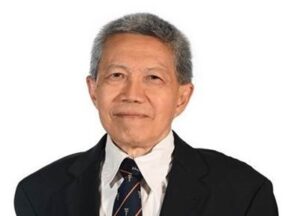
Tow Keang Lim, MBBS, FAMS, FRCP
Professor & Senior Consultant, Division of Respiratory & Critical Care Medicine, Department of Medicine, NUH, Singapore,
Professor, National University Hospital Singapore, Singapore
Title: High Reliability in Clinical Diagnosis: Reducing Noise with Intuitive Bayesian Thinking and Metacognition
Abstract: In this lecture, we will explore strategies to enhance clinical diagnostic accuracy by focusing on two powerful cognitive tools: intuitive Bayesian thinking and metacognitive reflection. We begin by introducing the concept of “noise”—the variability in clinical decision-making that can lead to inconsistent diagnoses—and how reducing it can improve reliability. We will then discuss how intuitive Bayesian reasoning, based on probability updating without complex calculations, allows clinicians to weigh evidence dynamically, enhancing their diagnostic precision.
The second half of the lecture will cover the role of metacognition in clinical decision-making. We will introduce the practice of broadcasting propositional confidence, where clinicians explicitly articulate their level of certainty in their diagnoses at various stages. This method not only helps refine individual decision-making but also fosters a culture of transparent thinking and collaborative feedback, leading to improved diagnostic reliability.
Through case-based examples and interactive discussions, participants will gain practical insights into integrating these approaches to minimize cognitive bias, reduce diagnostic errors, and ultimately improve patient outcomes.
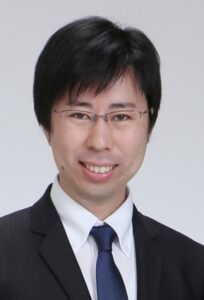
Masayuki Amano, MD, MBA
Department of Generalist Medicine, Minaminara General Medical Center, Japan
Title: Management of Diagnostic Uncertainty for Achieving Diagnostic Excellence
Abstract: Uncertainty management is crucial for achieving diagnostic excellence. By classifying uncertainty into three levels and applying appropriate strategies, we can improve clinical reasoning and decision-making. Causational diagnostic approach (CDA) is effective for lower levels of uncertainty, while effectual diagnostic approach (EDA) is valuable for higher levels. By integrating these approaches, we can navigate complex cases and provide optimal patient care.

Chew Keng Sheng, MD, MMED, MBA, PhD, FAMM
Deputy Dean (Graduate, Research & Commercialization), Consultant Emergency Physician
Faculty of Medicine and Health Sciences, Universiti Malaysia Sarawak (UNIMAS), Malaysia.
Title: TWED Checklist To Facilitate Metacognition In Clinical Decision-making
Abstract: This talk introduces the TWED checklist where “T = threat”, “W = What if I am Wrong? What else?”, “E = Evidences” and “D = pre-Dispositional influence”, a metacognitive tool developed to reduce cognitive biases in clinical decision-making. Cognitive biases are pervasive in medical practice, which, if left unchecked, can lead to diagnostic errors. The talk begins by outlining the principles of Dual Process Theory, and how System 1 (intuitive) and System 2 (analytical) thinking can influence decisions. It then outlines common cognitive biases encountered in clinical settings, such as anchoring, confirmation bias, and availability bias. Consistent with the Socratic questioning, the TWED checklist prompts clinicians to challenge their assumptions and consider alternative diagnoses systematically. The frequency and implementation of the checklist in practice are different from quadrant to quadrant. The talk concludes by advocating for the adoption of the integration of TWED checklist in future artificial intelligence models purported to support clinical decision making.
| Time Zone | Date & Time |
| Australia (Canberra) | Nov 26, 20:30-23:00 |
| Japan (JST), South Korea | Nov 26, 19:30-22:00 |
| Singapore, Malaysia, China, Philippines | Nov 26, 18:30-21:00 |
| Indonesia (Jakarta), Thailand, Vietnam | Nov 26, 17:30-20:00 |
| India, Sri Lanka | Nov 26, 16:00-18:30 |
| Netherlands | Nov 26, 11:30-14:00 |
| UK | Nov 26, 10:30-13:00 |
| United States (EST) | Nov 26, 05:30-08:00 |
*Countries with the highest number of participants are listed.
**Due to possible time differences depending on the region, we kindly ask
that you verify the schedule based on Japan Standard Time (JST) as a reference.
Program Committee (Japan Diagnostic Excellence Team):
Chair: Taro Shimizu
Program Committee: Shintaro Kosaka, Masaru Kurihara, Satoshi Watanuki, Yukinori Harada, Masayuki Amano, Kotaro Kunitomo, Ren Kawamura, Mamoru Komatsu, Kosuke Ishizuka, Sho Isoda
Acknowledgment: The Japan Society of Hospital General Medicine, Tokyo Generalist Alliance Project (T-GAP), Japanese Coalition for Patient Safety, Japan Primary Care Association

